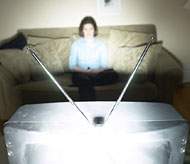German Dubbing:Losing its Glory ?

People have become adept at lip reading to get around the dubbing
http://www.expatica.com/source/site_article.asp?subchannel_id=26&story_id=1716&name=Dubbing+down
Dubbing downNo matter how people might try to defend it, dubbing of German television seems to have developed into another crude form of cultural imperialism. And says Andrew McCathie it can drive you mad.
Strangely enough I have never heard people saying the same thing about learning German from German TV — even though, at least according to German television, the whole world speaks perfect Hochdeustch (High German) with almost every programme that takes to the air dubbed to within an inch of its life. Instead of picking up the German language, many people say they have become adept at lip reading as a way of getting around the heavy-handed voiceovers and 'synchronisierung' that has turned dubbing into a major industry in Germany. Frankly, it can drive you mad.
Those actually doing the dubbing might have become big stars in their own right in Germany, but the whole process of sychronisierung wipes out regional and national differences in language with the actors' 'voices' seeming to come down to just a handful of dubbers. For a country that prides itself on its acting profession and theatres, there appears to be a very rudimentary understanding of the importance of language in even the most minor character roles. The madness appeared to reach a particular low point on the night of the death of Marlene Dietrich more than a decade ago when in marking her career German TV showed one of her English-language movies with Dietrich's sultry voice dubbed out and replaced by the bland voices from the television dubbing machine.
The conclusion was all too depressing. Germany might have very quality TV programming, but if Germans don't get it about the importance of Dietrich's voice in her acting, how can they get it for someone like Woody Allen or a cop from Liverpool or Muriel in the Australian film 'Muriel's Wedding'? The Germans are a sophisticated and educated lot, so how do they really feel when the die Glotze or boob tube takes them to some remote part of the world only to find that everyone there (surprise, suprise) speaks perfect German? Or as was the recent case when a young German man met a beautiful young Portugese woman. “I don’t speak Portugese,” he told her. Don’t worry, she said, “I speak German”. I am afraid I flicked on so I didn't hear why she spoke German or if it had anything to do with the storyline. Even TV addicts say they have given up following their favourite shows in Germany But how can it be that Germans will tell you that it was only after a visit to Britain that they were for the first time able to hear the Queen's squeaky porcelain voice in its royal glory?
At least now with the arrival of international television via cable TV Germans can cringe with the rest of us when they hear George W Bush attempting to piece a sentence together or reducing the word 'terrorist' to one syllable. With the whole world speaking German, as German television would have it, flicking into a TV movie or programme after it has started can very problematic in Germany as it often takes a while to work out what country a programme comes from. Is there anything more irritiating than hearing those excruciating voices when some of our older dubbing friends do the voiceovers for children? And for that matter do the dubbing for some of those older people. Who on earth does those weird 'voices' for The Golden Girls?
New TV technology and programming has helped, with some televisions allowing viewers to watch programmes in their 'original sprache'. But even the most hardened television addicts will tell you that they have to an extent given up on trying to keep up with their favourite shows in Germany, partly because they seemed to have been transformed into quite different programmes by the, let’s face it, highly unwelcome dubbing process. There appears to be a very rudimentary understanding of the importance of language Germans insist that German-speakers are in the minority with their language, and without dubbing their language would be swamped by a world which is already dominated by English. But other even smaller nations make do and in fact almost celebrate showing programmes from other nations, often with subtitles. There is a sense of: that is their culture and this is our culture.
Interestingly enough, it is the old European fascist powers of Germany, Italy and Spain which during the dark pre-war days seemed to use dubbing as a form of censorship that now seem most concerned about maintaining their dubbing industry. Unfortunately, far from protecting their own language, the reality is that the dubbing game appears to have developed into nothing less than a rather a clumsy form of cultural imperialism.
February 2005
[Copyright Expatica 2005]
Subject: Life in Germany, TV, films dubbing

0 Comments:
Post a Comment
<< Home